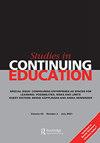经合组织成人教育政策中的解决方案主义和神话:葡萄牙和斯洛文尼亚的技能战略
IF 1.9
4区 教育学
Q2 EDUCATION & EDUCATIONAL RESEARCH
引用次数: 0
摘要
国际政府组织(IGO)在全球政策制定中的作用在21世纪的成人学习和教育(ALE)领域受到了极大的关注,经济合作与发展组织(OECD)被认为是最具影响力的IGO之一,因为它的技能调查-例如国际成人能力评估计划(PIAAC)。然而,虽然该领域的大多数实证研究都集中在PIAAC数据的分析上,但很少注意经合组织技能战略对发展和/或改进国家ALE系统的影响。这项研究解决了两个经合组织成员国——葡萄牙和斯洛文尼亚的这一差距——通过应用“问题代表了什么?”的政策分析方法,并使用神话的理论概念来定义政策问题。我们的研究结果表明,尽管两国的ALE制度不同,但它们的共同问题表征强化了几个政策神话:ALE是解决社会经济问题的解决方案;失业是低技能成年人的问题;以学习者为中心的方法是提高ALE参与的一种方式,改进治理是推进国家ALE系统的一种手段。本文章由计算机程序翻译,如有差异,请以英文原文为准。
The OECD solutionism and mythologies in adult education policy: skills strategies in Portugal and Slovenia
ABSTRACT The role of international governmental organisations (IGOs) in global policymaking has received significant attention in the field of adult learning and education (ALE) in the twenty-first century, and the Organisation for Economic Co-operation and Development (OECD) was recognised as one of the most influential IGO due to its skill surveys – such as the Programme for the International Assessment of Adult Competencies (PIAAC). However, while the majority of empirical studies in the field have focused on the analysis of PIAAC data, little attention has been given to the influence of the OECD skills strategies on the development and/or improvement of national ALE systems. This study addresses this gap in two OECD member states – Portugal and Slovenia – by applying the ‘what’s the problem represented to be?’ approach to policy analysis and using the theoretical concept of myth in defining policy problems. Our findings indicate that although both countries’ ALE systems differ, they share problem representations that reinforce several policy myths: ALE is a solution to tackle socioeconomic problems; unemployment is a problem of low-skilled adults; the learner-centred approach is a way to raise participation in ALE, and improved governance is a means to advance national ALE systems.
求助全文
通过发布文献求助,成功后即可免费获取论文全文。
去求助
来源期刊

Studies in Continuing Education
EDUCATION & EDUCATIONAL RESEARCH-
CiteScore
4.70
自引率
6.70%
发文量
22
期刊介绍:
Studies in Continuing Education is a scholarly journal concerned with all aspects of continuing, professional and lifelong learning. It aims to be of special interest to those involved in: •continuing professional education •adults learning •staff development •training and development •human resource development
 求助内容:
求助内容: 应助结果提醒方式:
应助结果提醒方式:


